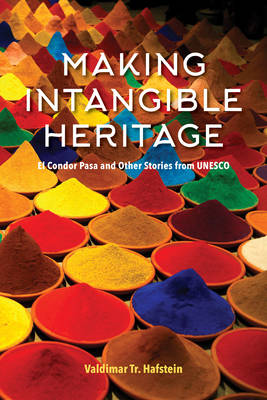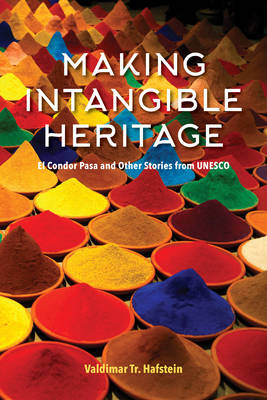
- Afhalen na 1 uur in een winkel met voorraad
- Gratis thuislevering in België vanaf € 30
- Ruim aanbod met 7 miljoen producten
- Afhalen na 1 uur in een winkel met voorraad
- Gratis thuislevering in België vanaf € 30
- Ruim aanbod met 7 miljoen producten
Making Intangible Heritage
El Condor Pasa and Other Stories from UNESCO
Valdimar Tr HafsteinOmschrijving
In Making Intangible Heritage, Valdimar Tr. Hafstein--folklorist and official delegate to UNESCO--tells the story of UNESCO's Intangible Heritage Convention. In the ethnographic tradition, Hafstein peers underneath the official account, revealing the context important for understanding UNESCO as an organization, the concept of intangible heritage, and the global impact of both. Looking beyond official narratives of compromise and solidarity, this book invites readers to witness the diplomatic jostling behind the curtains, the making and breaking of alliances, and the confrontation and resistance, all of which marked the path towards agreement and shaped the convention and the concept.
Various stories circulate within UNESCO about the origins of intangible heritage. Bringing the sensibilities of a folklorist to these narratives, Hafstein explores how they help imagine coherence, conjure up contrast, and provide charters for action in the United Nations and on the ground. Examining the international organization of UNESCO through an ethnographic lens, Hafstein demonstrates how concepts that are central to the discipline of folklore gain force and traction outside of the academic field and go to work in the world, ultimately shaping people's understanding of their own practices and the practices themselves. From the cultural space of the Jemaa el-Fna marketplace in Marrakech to the Ise Shrine in Japan, Making Intangible Heritage considers both the positive and the troubling outcomes of safeguarding intangible heritage, the lists it brings into being, the festivals it animates, the communities it summons into existence, and the way it orchestrates difference in modern societies.
Specificaties
Betrokkenen
- Auteur(s):
- Uitgeverij:
Inhoud
- Aantal bladzijden:
- 212
- Taal:
- Engels
Eigenschappen
- Productcode (EAN):
- 9780253037930
- Verschijningsdatum:
- 1/10/2018
- Uitvoering:
- Paperback
- Formaat:
- Trade paperback (VS)
- Afmetingen:
- 152 mm x 229 mm
- Gewicht:
- 294 g

Alleen bij Standaard Boekhandel
Beoordelingen
We publiceren alleen reviews die voldoen aan de voorwaarden voor reviews. Bekijk onze voorwaarden voor reviews.











